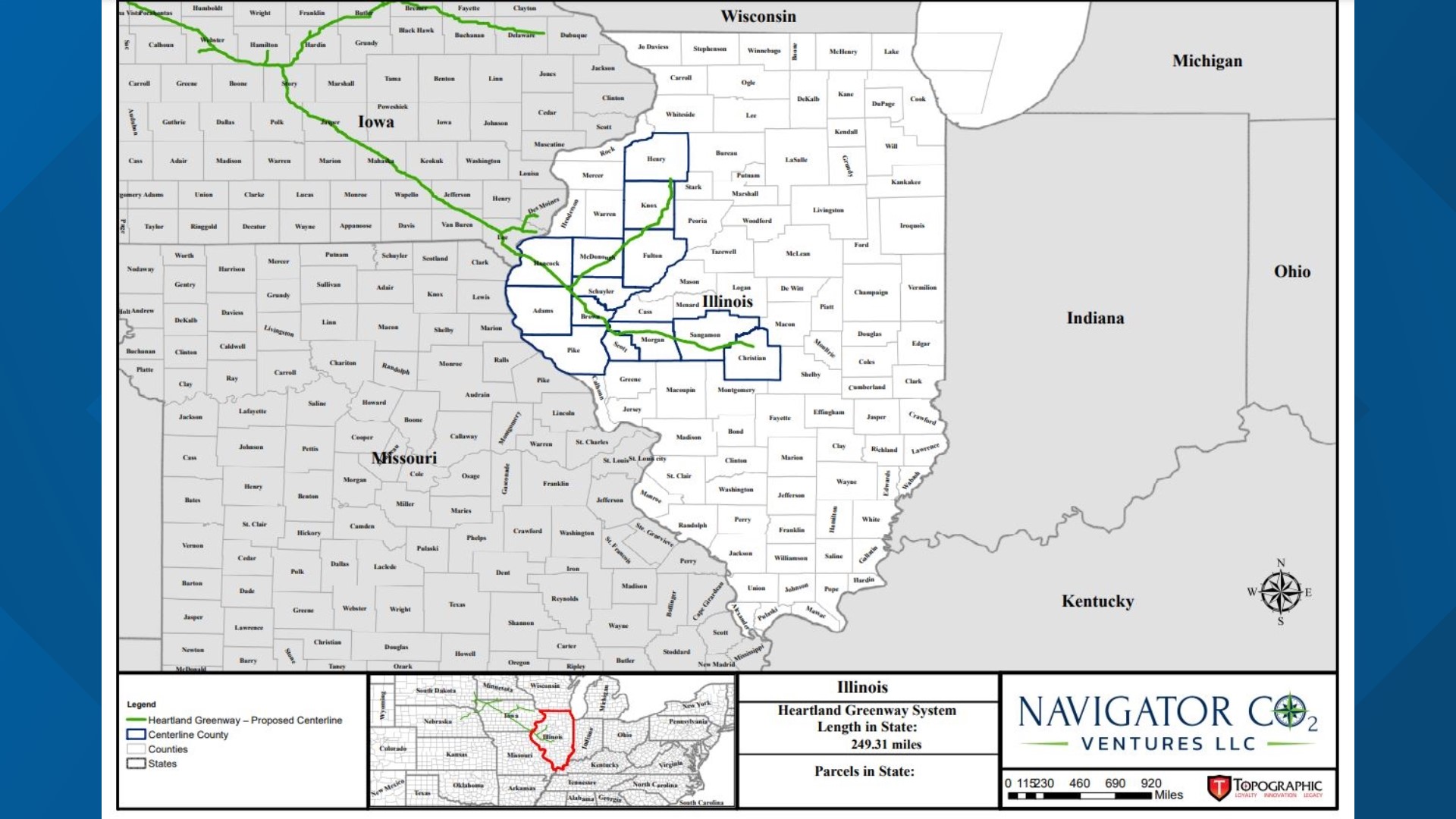WILLIAMSFIELD, Ill. — Navigator CO₂ Ventures has filed for a certificate of authority from the Illinois Commerce Commission, a petition it needs to get approved before it can start construction on the 1,300-mile carbon capture pipeline.
The "Heartland Greenway" pipeline is proposed to be built across five states, including Illinois, Iowa, Minnesota, Nebraska and South Dakota. About 250 miles of the pipeline would run through 13 Illinois counties.
The pipeline would capture carbon dioxide from the air, turn it into liquid and then store it in the ground at least a mile deep at a sequestration site in Christian County, Illinois. It would connect to the Big River Resources ethanol plant in Galva and travel through Hancock, Adams, McDonough, Henry, Knox, Fulton, Schuyler, Brown, Pike, Scott, Morgan, Sangamon and Christian counties.
The Heartland Greenway pipeline was originally mapped to run through Clinton County, Iowa, but no longer will. Instead, a new pipeline backed by Archer Daniels Midland Company, known as ADM, and Wolf Carbon Solutions has been proposed there.
The carbon capture pipelines are meant to help the ethanol industry remain viable as federal and state governments look to limit greenhouse gas emissions. Navigator says it will offset the emissions of 15 million metric tons of CO₂ each year.
Opponents are concerned about the pipeline permanently damaging farmland and threatening the safety of residents living nearby.
John Feltham is one of those opponents. He owns and operates 222 acres of farmland near Williamsfield in Knox County. He said the pipeline will run through half a mile of his property.
"It's going to go through... three layers of erosion control terraces, which overlay drain tile extending across a grass waterway that overlays a parallel drain tile," Feltham said. "The pipeline will cut all of those tile and as it leaves the farm, it's going to pass through one more inlet, or riser, as we call it on the tile system, and if those tiles are obstructed by the pipeline and cannot be reconnected, farmland is permanently damaged."
He's also the president of the Citizens Against Heartland Greenway Pipeline organization.
On Wednesday, Sept. 28, representatives from the Coalition to Stop CO₂ Pipelines will be speaking to the Knox County Board about its concerns. They'll also be asking the board to intervene in the ICC's proceedings.
Navigator filed its petition with the ICC on July 25. The ICC has 11 months to make a decision, reviewing evidence from Navigator's lawyers and lawyers representing those who oppose the pipeline. County governments have the option to participate in the review, create a six-month pause to construction while they finish studying the impact of the pipeline, or draft zoning laws to mandate how closely the pipeline can be built next to residential areas.
Sangamon County has already filed a petition to intervene.
"The Knox County Board has an opportunity to make itself heard at the proceeding," Feltham said. "So we want to make sure that the members of the board and the Knox County State's Attorney are aware of what they can actually do."
Navigator has yet to file for permission to construct the pipeline in the other four Midwestern states the pipeline would pass through.
The company also needs permits from various federal, state and local agencies including the U.S. Army Corps of Engineers, U.S. Fish and Wildlife Service, Illinois Environmental Protection Agency and Illinois Department of Transportation.
If Navigator does receive approval from the ICC, Feltham said he's not stopping his fight against the pipeline.
The 2011 Carbon Dioxide Transportation and Sequestration Act categorizes CO₂ pipelines as being “in the public interest, and a benefit to the welfare of Illinois." If ICC approves the certificate of authority, Navigator could use eminent domain to take over land in the pipeline's route, meaning it doesn't need landowners to formally sign over their land.
"If the Illinois Commerce Commission rules against us, I'm going to encourage our membership to litigate the constitutionality of the Carbon Dioxide Transportation and Sequestration Act, because I think it contains a glaring 14th Amendment violation because it denies landowners the opportunity to contest the need for the pipeline. And it also denies the Illinois public that same need," Feltham said. "I'd like to take this to the Supreme Court of the United States."
The Coalition to Stop CO₂ Pipelines will be speaking to the Knox County Board on Wednesday at 6 p.m.
Watch more news, weather and sports on News 8's YouTube channel

